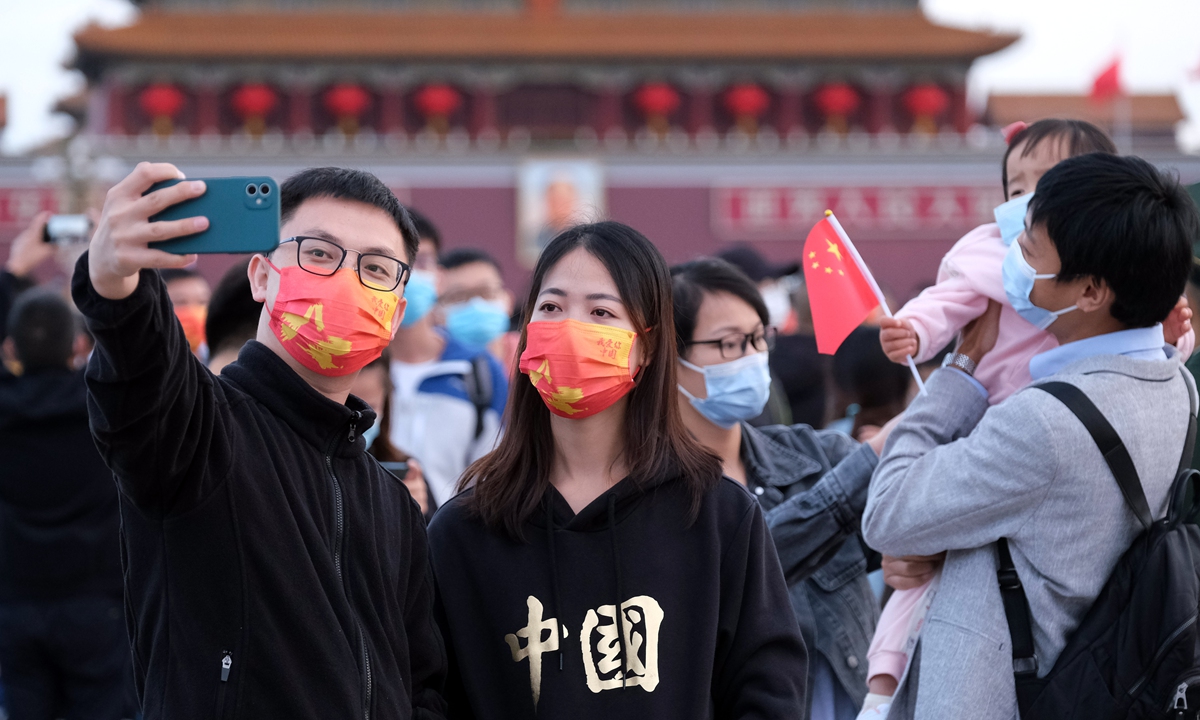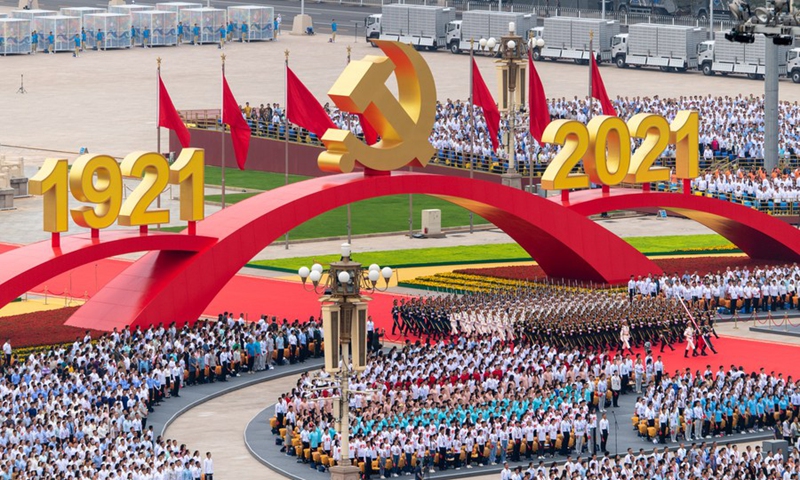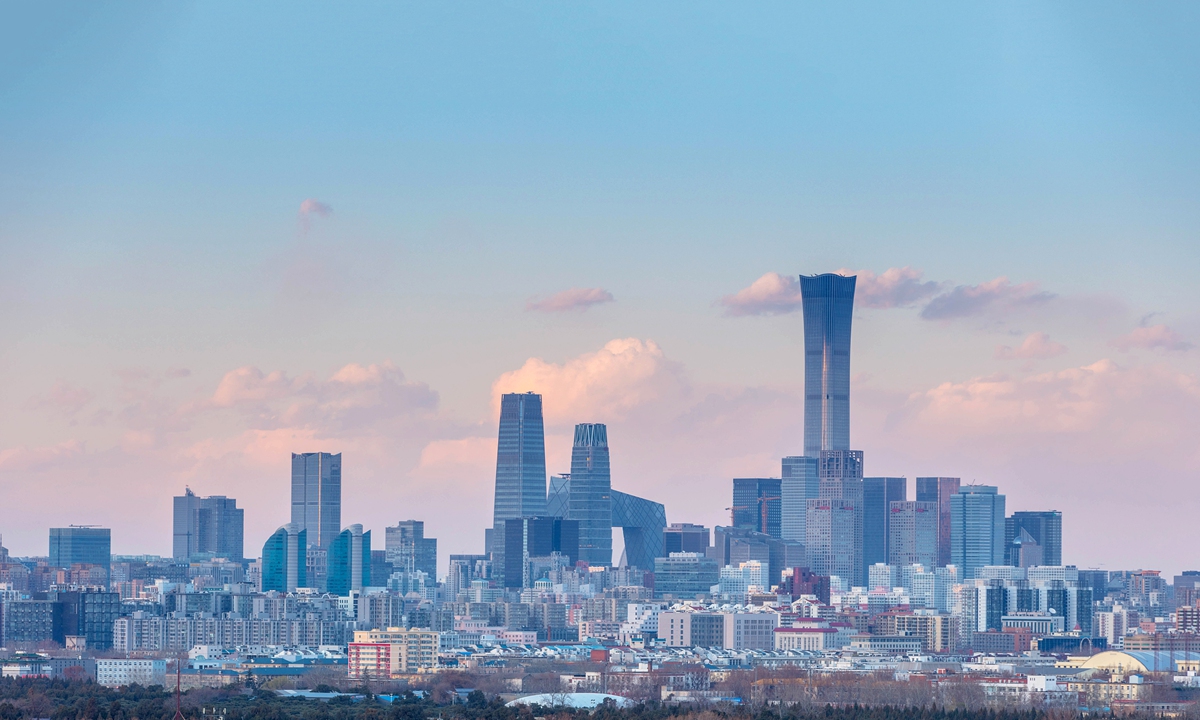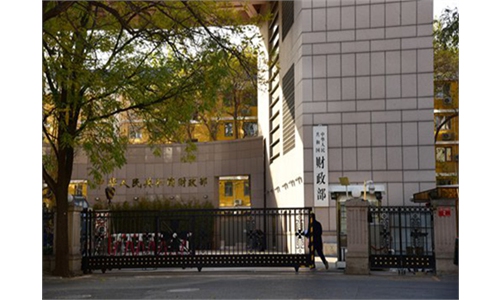10 years on, with growing confidence, China’s Gen-Z finds the West no longer attractive: GT surveys

Photo: VCG
Editor's Note:
When it comes to rapid domestic development and global ascendance, there is hardly any parallel to what China has achieved over the past decade. In a poll conducted by the Global Times Research Center in 2012, over half of foreign respondents viewed China as a "world power." But Chinese people were humbler, with only 34.9 percent of Chinese respondents to a 2014 survey seeing their country as a world power, despite China's rise to become the world's second-largest economy.
However, a decade later, with growing interactions with the world and remarkable domestic development, Chinese people, especially the Generation-Z, have become increasingly confident. Most Chinese youths no longer blindly admire the West and have started to see the outside world, especially the West, on an equal footing. Beyond the growing confidence of the country as a major power, Chinese people are now starting to think about how China should reshape the world.
Through in-depth analysis on the survey results conducted by the Global Times Research Center over the past 10 years, the Global Times aims to explore why Chinese people are becoming more and more confident. This is the first of the two-part analysis, which shows that behind these changes is a great boost of China's national strength and image.
Being humble is quite a traditional characteristic of the Chinese people ingrained in Chinese culture, and the surveys done by the Global Times Research Center in past 10 years just found that when most foreigners considered China to be a world power, most Chinese still couldn't believe their country was powerful enough to make such a claim. Surveys and interviews with experts and voluntary participants revealed that Chinese people held stricter standards for their own country, and they didn't want to admit to success lest they appeared conceited or arrogant.
10 years ago, when talking about the compliments from the West on China's development, many Chinese appeared to be cautious. In Chinese culture, there is a concept called "Pengsha" which means to make someone conceited by flattering, so that he/she will stop working hard or will make mistakes, which is a classic way to cheat rivals in competition. So when the Western countries, especially the US, are talking about China's rise and capability and say that China is a "free-rider" of the Western-dominated world order and that it should be a "responsible stakeholder," many Chinese see this as a case of "Pengsha," said analysts.
The questionnaire in 2012 had covered eight countries including 7,045 interviewees aged 18-64 from the US, the UK, Germany, Japan, Russia, India, South Africa and Brazil, and 19 percent of them believed "China has already become a super power in terms of comprehensive national strength," and 34 percent of them believed China was a "world power."
At the end of 2011, the Global Times Research Center surveyed people from major cities across China, and among them there were only 14.1 percent interviewees who considered China a world power while 51.3 percent of them said "China is not yet a world power" and 33.4 percent of them said "China is not a world power at all."
Zhang Yiwu, a professor at Peking University, said "this is normal. Because foreigners could see China's growing global influence more clearly and directly than Chinese people who live in China," and the most crucial reason is that China still got many problems and difficulties that need to be solved amid the process of its fast development, so Chinese people have higher expectations and stricter demands toward their own country.
Jin Canrong, associate dean of the School of International Studies at the Renmin University of China, said that those Westerners who criticized China for not having freedom of speech have no idea what's been going on among Chinese social media in the past decade.
"Quite a number of Chinese netizens hold their country to very high standards, wishing for China's welfare system and per capita income to surpass those of Switzerland and Denmark, for the industrial capability and product quality to surpass those of Germany and Japan, for the military strength to surpass that of the US and Russia; and for the ecological environment protection level to surpass that of New Zealand…and as long as China can't deliver these, they would freely complain online all the time and downplay the concrete achievements of the country," Jin said.
"They are impatient for their wishes to be satisfied. To be honest, such demands are not very realistic, and it can't help the Chinese people to better understand China's international status," he noted.
However, such high demands from the netizens have to some extent encouraged the Communist Party of China and the Chinese government to endeavor toward a fast-paced and high-quality development to satisfy the Chinese people, and this is the reason why China was able to reach so many achievements, especially in past decade, said analysts.
This has been reflected in the Global Times surveys too. In 2013, a year after the 18th National Congress of the CPC, the survey showed that more and more Chinese people have been more confident and optimistic than the previous years.
The 2013 survey covered 1,539 samples from seven major cities across the country. It shows that 40.4 percent of the interviewees believed that the economy would "keep growing year-on-year in next five years," while in 2012, 32.5 percent had the same opinion. In 2013, less people believed China would experience an economic downturn or that the economy would fluctuate up and down in following five years.
The successful governance of the new leadership, after the 18th National Congress of the CPC, boosted confidence in the economy, and the effective reforms in politics, the military and people's living standards were also reflected in the survey by the Global Times. In 2013, 74.3 percent of the interviewees said the living standard had improved, an increase of 1.3 percent over 2012. And 68.7 percent of them believed the Chinese military was able to defend the country from invasion by other major world powers in 2013, a 0.7 percent year-on-year increase.
In 2013, 72 percent of the interviewees believed that "China could continue marching on the path of socialism with the Chinese characteristics," which saw a 4.3 percent increase over 2012.
Two years later, the trend was getting increasingly clear. According to a 2015 survey focusing on Chinese people's expectations toward their country's development which covered 2,203 samples from 16 Chinese cities across countries, 86.1 percent of participants declared that "China is marching on the right path for development" while 73.7 percent of them agreed with the statement: "Although Chinese economic growth is slowing down, it's reasonable to keep the growth rate at around 7 percent."
Additionally 84.3 percent of them believed that in the following 5 years, China would make progress in cracking down violent terrorist activities that threaten the country's stability, and would improve public order and development. The remarkable results achieved in China's Xinjiang in terms of safety, with no terrorist attacks being perpetrated since 2017, prove, according to analysts, that the Chinese government has delivered what its people had expected.
The survey also showed that 86.2 percent of the interviewees believed that China would achieve significant or major progress in the fields of science and technology in the following 5 years, and in recent years, due to China's key achievement in 5G technology and other cutting edge sci-tech areas, the country has remarkably changed and improved the way of life for its own people, which to a certain extent prompted the US to launch a crackdown to contain China's development using unfair measures in multiple fields.
Finally, 68.1 percent of the interviewees believed that their living standards would improve within the following 5 years. Based on their confidence about the country's development, most Chinese interviewees also showed high optimism on the future international status of the country.
From 2015 to 2021, the Chinese interviewees of the Global Times survey showed optimism toward China's development in the international context, with 90 percent of them holding this kind of view. In 2019, the proportion of optimistic interviewees dropped to 80 percent because of the trade war launched by the US and the Hong Kong turmoil, and later, due to the impact of the COVID-19 pandemic, this proportion dropped to 78.5 percent in 2021.
But Chinese citizens are still much more optimistic than most people in other countries. For example, most Americans are unsatisfied and pessimistic about their own country. According to Gallup, since July 2021, the quantity of American people who declare themselves to be "satisfied with the way things are going in the United States at this time" never got higher than 30 percent, and according to the latest data in May 2022, the number stopped at a mere 16 percent.

A national flag-raising ceremony is held at Tian'anmen Square during a ceremony marking the centenary of the Communist Party of China (CPC) in Beijing, capital of China, July 1, 2021. Photo: Xinhua
It's time to be confident
Optimism does not necessarily immediately bring confidence. Another reason that leads Chinese people to have moderate confidence on the country's achievements is that mainstream ideas in Chinese society were still humiliating in front of the West or the US hegemony.
The Chinese elites in various fields used to mostly worship the West on everything, or believed the US was undefeatable and unchallengeable and that it would be unwise for China to resist the bullying from the US, analysts said, noting that, in other words, the Chinese were still looking up to the West.
Some pro-West liberals were insisting on telling the Chinese people that China should abandon its socialist political system and embrace the West. They believed their role was to "enlighten" Chinese and they paid great efforts to lecture the people saying that it is wrong to retaliate the US crackdown and there is no chance for China to modernize if it refuses Westernization. These liberals used to be very influential among Chinese social media networks, like Sina Weibo, and they attacked anyone who upheld ideas of patriotism and socialism.
The media and intellectuals in the past, who were deeply influenced by and worshiped the West or the US, also did not do a great job at telling the Chinese people how advanced China has become in some areas, and how China's powerful national strength can serve the interests of the people, said Shen Yi, a professor specializing in cyberspace at Fudan University.
At that time, Chinese people were not ready to accept the idea that China is a powerful country and should be ambitious, contributing more to the world. When the media filmed some documentaries to objectively show China's strengths and achievements in sci-tech or industrial areas, such as Amazing China in 2018, some domestic intellectuals and liberalist scholars have been very critical, worrying that this kind of self-praise could make Chinese people conceited, or it could make the US concerned and anxious, causing a further US crackdown against China.
Jin said this kind of thinking is truly nonsense, because the US doesn't learn about China from this kind of documentaries, but from its intelligence agencies and the information collected from its media, companies and diplomats worldwide, so it is ridiculous to believe that keeping a low-profile could help China avoid crackdowns from a hegemonic super power.
Lü Xiang, an expert on US studies and research fellow at the Chinese Academy of Social Sciences, told the Global Times that China used to explain to the US that it has no intention of challenging its hegemony, but the US just can't be convinced as long as China refuses to give up its development, "because US decision-makers do not care about intentions, they only care about capability."
Jin said "A friend from the US asked me once: 'have you ever seen an elephant that can hide behind a rabbit?' Meaning there is no way to hide, so there is no need to hide."
Therefore, in the past 10 years, China has realized that it can and should confidently show its strength and achievements to its people and the world, and should make better use of its strengths to contribute to the world's development toward a globalization that is not exclusively dominated by the West.
At the same time, China should also firmly retaliate against unfair crackdowns and stigmatization from the outside world. This will likely make some arrogant and hostile Western powers uncomfortable, said analysts, noting that as long as China remains powerful and keeps developing, the West will eventually get used to it, because it's inevitable.

CBD File photo:VCG
The Global Times survey of 2021 showed that more and more Chinese people have stopped looking up to the West. Approximately 90 percent of young Chinese participating in the survey conducted from April 9 to April 12, from a total of 1,281 responses covering 129 cities in the country, believe that China should not "look up to the West" anymore, while more people have started "looking down on the West" in the past five years, due to multiple reasons including China's achievements and the West's failed handling of the COVID-19 pandemic.
Chinese analysts said the sustainable and fast development of China is the core reason why more Chinese are becoming increasingly confident, and some key elements have sped up the process such as the rise of Trumpism in the US, which revealed shocking anti-intellectualism, racial problems and inefficiencies regarding governance among major Western countries.
The survey showed also that 37.2 percent of the participants five years ago, still believed they should "look up to the West," but now, only 8.1 percent of these people hold the same view. Meanwhile, the people who "look down on the West" have increased to 41.7 percent while only 18.4 percent of them retained the same opinion they expressed five years prior. About 48.3 percent of the participants see the West as an equal now.
The change of Chinese views regarding the West will make China more confident in handling external provocations and stigmatization as the Chinese people will not accept their country tolerating, compromising or remaining silent over issues of their core concern, experts said. The West should also learn to deal with China on equal terms, being more respectful toward Chinese public opinion rather than simply labeling the increased Chinese confidence as "rampant nationalism."
In the past decade, Chinese people's confidence toward their country has risen remarkably, and they are getting a much clearer understanding about China's status in the world. All these changes are based on the stable trend of China's development and the increasing inclusiveness and openness of the country after the 18th National Congress of the CPC. Indeed the level of integration between China and the international community is significantly improving, with more Chinese people having seen the outside world with their own eyes and having had an in-depth understanding of Western countries through overseas study or work. Chinese people are no longer blindly believing fairy tales about Western democracy and capitalism, but have achieved a much more mature and objective understanding of the West.
Changing views on diplomacy
A senior Beijing-based expert on international relations told the Global Times, on condition of anonymity, that China tends to emphasize a balanced approach in dealing with other countries in past decade. "In their worldview, most Chinese people lowered the China-US relations to a secondary place, partly because they feel the US might not be the perfect model for China to learn from," he said.
China used to learn from the US in many fields in order to realize modernization, and the US was also willing to cooperate with China, but in the past decade, the US has changed its attitude toward China as it found China has become more and more powerful, refusing to compromise to the US hegemony, so Washington's attitude toward China is getting increasingly hostile, and Sinophobia hyped by some US media and politicians has poisoned US society badly, experts said.
"Additionally, the problems of the US society and political system have been exposed more frequently and some serious problems like gun control, income gap, racism, anti-intellectualism and the rise of Trumpism have shocked many Chinese people, so that they no longer admire the US and believe that there isn't much to learn from the US," the anonymous expert said.
Views about the China-Japan relations are also subject to change and that is mostly due to the Japanese government's constant refusal to honestly face its historical problems and the island country's constant provocations of China on matters like the Diaoyu Islands and Taiwan, said Chinese analysts.
More importantly, the power balance between China and Japan has totally changed in the past decade as China has been improving in all areas (economy, science, technology, military etc.), thus achieving a new level of strength and resiliency, said experts.
From the 1990s to 2000s, although China and Japan had disputes and frictions from time to time over historical problems and sovereignty issues, China still sees Japan as a key power that it must deal with, however in recent years, many Chinese found out Japan is not a real independent country, but a country directed by a puppet government controlled by the US, analysts said.
More and more Chinese found that Tokyo's decision-making is often not based on the real interest of Japanese people in many cases, but based on US interests, especially when it comes to diplomacy and security issues, that is why Chinese people do not attach much importance to the ties with Japan anymore, deeming it more useful to deal with the US, the one who can effectively control Japan, said the anonymous expert.
Since Chinese people are becoming more confident, and the Chinese government is promoting the China-proposed Belt and Road Initiative, most people prefer to deal with countries that demonstrate respect and friendliness toward China, such as those who show firm support when China receives pressure and provocations from the US and other Western countries, such as Russia, organizations with great economic influence like the EU, who can at least make some independent and pragmatic decisions, or the ASEAN and African countries who have welcomed China's increasing influence and presence and know how to build mutually advantageous cooperation, analysts said.
When Chinese no longer only look up to developed Western countries, it means that Chinese people are getting used to being citizens of a major power that have the equal status, strength and chance to change the world like Western countries in the modern world order, so they are changing their mindset from "how to benefit from the order dominated by the West" to "how to reform the world order to make it fairer and more reasonable to better serve the demand of the majority of the international community," said analysts.
And such a change will definitely impact the world's view on China. From questioning the fact of China's development to acknowledging China's status as a major power, now the world is paying attention to how China will change the existing world order. In the second half of the article, the Global Times will present the changing views of the world on China in the past decade.
Liu Caiyu, Zhang Han, Wan Hengyi also contributed to the story




